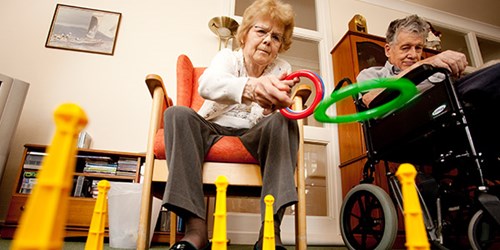Human rights based standards involve
Empowerment
People who use and deliver services should know and uphold human rights by setting out how those rights should be realised in care settings.
Ability
Service providers should be able to respect, protect and fulfil human rights by clearly communicating how human rights should apply in care settings.
Accountability
Service providers should provide care that is consistent with human rights and be held to account when they don't.
National Care Standards
Embedding human rights in regulation, inspection and monitoring frameworks can contribute to a culture which realises human rights in practice.
In 2014, the Scottish Government began a review of the National Care Standards for the first time since 2002. The National Care Standards describe what people using a range of care services in Scotland can expect.
Some 23 sets of current standards cover a wide range of care settings including childminders and nurseries, care homes, housing support, services for people in criminal justice supported accommodation and independent hospitals. The standards are written from the point of view of people who use services. They are one way that the Care Inspectorate and Health Improvement Scotland assess the quality of care.
The Scottish Government's review of the National Care Standards recognised the importance of human rights to ensuring universal high quality care, regardless of how that care was being delivered.
The Commission wants to see this policy goal turned into practice. We believe this should happen by developing robust human rights based standards and through clear communication of the shift in practice which will be required. The Commission acts as a reference point for the development of the revised National Care Standards. We will also sit on the Project Board for this work.
Self Directed Support
Integrating health and social care has been a recent major reform in Scotland, and makes up part of the agenda of personalisation. This approach aims to put individuals at the centre of all decision making, to make sure the care and support people need at every stage is integrated. The move towards self directed support is a good example of person-centred empowerment, especially through the Self-Directed Support (Scotland) Act 2013 (this is also available in Easy Read format).
While the Act, and more awareness about these important principles, is to be welcomed, implementation at a local level has been highlighted as an area of concern. To make a real difference much more must be done to increase understanding of how such approaches can be used in practice. This can mean making different decisions around how resources are allocated and used – especially in these times of austerity.
It also highlights that people working in social care have a key role to play, so that staff as employees understand their rights, and that they can provide rights-based approaches in their roles. Human rights based approaches have the opportunity to provide greater staff empowerment for creativity and personalised responses.
Project & Initiatives
Care About Rights
The Scottish Human Rights Commission has developed training and awareness raising resources relating to the care and support of older people.
Social Care resources
Help & Advice
Mental Welfare Commission for Scotland
The commission protects and promotes the human rights of people with mental health problems, learning disabilities, dementia and related conditions
See Me Scotland
Scotland's programme to tackle mental health stigma and discrimination.





Social Care
There are many examples where human rights have been considered in health and social care. The Dementia Strategy is one example, and there are other examples of good practice across many services. This approach aims to put individuals at the centre of all decision making, to make sure the care and support they need at every stage is indeed integrated. The move towards self-directed social care support is an intended example of such person-centred empowerment.
However, there are also many examples where the provision of health and social care is not embedded in the day to day experience of people receiving care, or the people delivering care. There are still some big gaps when it comes to respecting and protecting people's rights in social care settings. For example,
The Commission is committed to working with others to ensure that delivery of our health and social care system is based on rights. We want all care services – across the public, private and third sector – to respect all rights, including the right to the highest attainable standard of physical and mental health. We want to see that approach taken in hospitals, healthcare settings and in the community.
Our Strategic Plan for 2016–2020 commits the Commission to continuing to work with public bodies including NHS Health Scotland, the Mental Welfare Commission and Healthcare Improvement Scotland to promote human rights in the way healthcare strategy and policy is developed, designed and delivered. We will continue to play an active role in the Health and Social Care Action Group, convened through SNAP – Scotland’s National Action Plan for Human Rights.
The Commission will act as a reference point for the development of revised National Care Standards. We will also sit on the Project Board for this work to ensure that human rights are at the heart of the new standards.